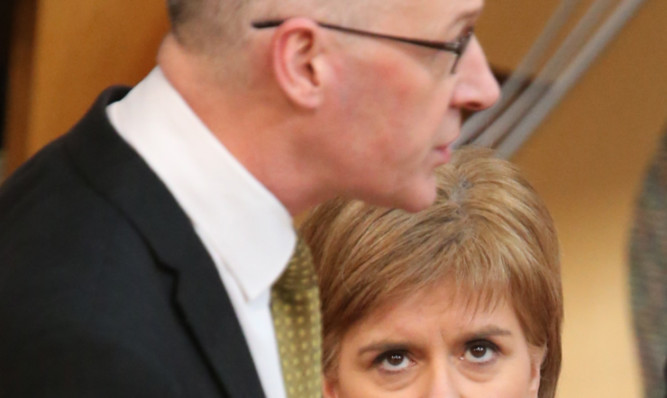If you don’t watch Scottish politics closely you’d be forgiven for being confused by the current contretemps between Holyrood and Westminster.
It revolves around the handing over of more powers to Scotland, in a deal thrashed out in the wake of the independence referendum of 2014.
Although the Scottish Nationalists famously lost that fight, when voters rejected separation, they went on to win the “peace”.
The Unionist parties duly sat down with the SNP and agreed to a package of extra measures to be enshrined in the new Scotland Bill that will make the country’s devolved parliament one of the most powerful in the world.
Scottish ministers will have full control over income taxes and welfare payments, on top of all the other areas of domestic policy they already manage.
While short of actually breaking up Britain, the SNP could claim to have snatched some kind of victory from the jaws of their referendum defeat.
How odd, then, that this week the latest in a long round of talks has taken place between the UK Treasury and the SNP finance minister and Deputy First Minister John Swinney to try to persuade the latter to accept the new powers.
Running away
Far from being desperate to get his hands on Scottish taxpayers’ money, Swinney seems to be running away from the prospect.
The sticking point is the fiscal framework that will establish how much of Scotland’s £30 billion block grant from Westminster will be cut, once tax raising comes within the Holyrood remit.
Although the Treasury had thought progress was being made in the negotiations, Swinney has invented a fresh grievance.
He is demanding Scotland’s budget is not just cushioned by UK funds now but at any point in the future.
This, he argues, is to safeguard Scotland in the event its population growth is slower than England’s and its economy does not grow as fast.
UK ministers object and with good reason. If English taxpayers stimulate their economy, why should those resources head north to bail out the less enterprising Scots?
The SNP premise, that this is now about population growth and therefore an immigration issue, sounds like mission creep.
The Nationalists did agree to the terms of the Smith Commission which pre-empted the Scotland Bill and so they know immigration powers are not on this particular table.
Another spanner
But just say London did give in and work out some kind of border arrangement whereby Scotland could take in proportionately more refugees (and keep them) than England, almost impossible though that would be.
The chances are that Swinney and his colleagues would then throw another spanner in the works to further delay a deal that would bring with it responsibilities, apparently feared by the Nationalists.
The same people who vowed to set Scotland “free” in 2014 are, now that some extended degree of freedom has been offered, refusing to accept it because of the risks involved.
Why, it’s as if they don’t trust themselves to run the economy without the perpetual safety net of the Treasury.
There is such a contradiction in the SNP holding out for ever greater protection from the UK when their real aim is to cut off ties completely, that we can only draw one conclusion.
This looks increasingly less like a financial wrangle and more like a political one. With Scottish elections only three months away, it suits the SNP to campaign on a constitutional platform.
If they can go to voters in May complaining about having their grand plans for Scotland thwarted by the London Tories, they will be on familiar territory.
Deadline fading
The likelihood of the two sides reaching agreement by Valentine’s Day, the deadline set by Nicola Sturgeon, is receding fast and time is running out to secure a consensus before Holyrood breaks up in late March for the election (despite Chief Secretary to the Treasury Greg Hands offering a “generous deal” on Monday).
Sturgeon and Swinney will no doubt hope voters can be persuaded to support them overwhelmingly, as they did in last year’s general election, on the grounds that theirs is the party that puts Scotland first.
How much easier their task will be if they don’t have to defend their record in office, or their wildly inaccurate predictions over the price of oil (that would have bankrupted a separate Scotland by now) and can instead blame the UK government for all this nation’s problems.
To those of us who pray for the Nationalists’ demise, it is bewildering that the electorate has yet to see through this oft-repeated ploy. How can it be spelled out more clearly?
If Swinney fails to do a deal and the SNP reject powers they have long fought for, the Nationalists cannot look voters in the eye and expect to be taken seriously. Can they?
